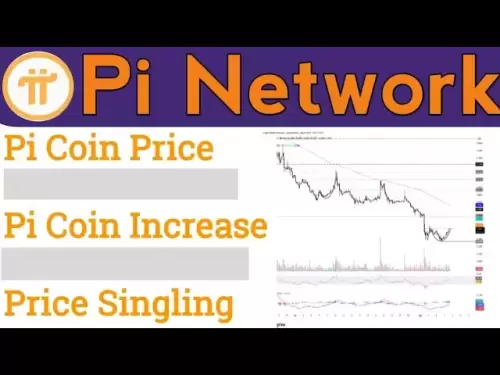-
 Bitcoin
Bitcoin $118300
1.01% -
 Ethereum
Ethereum $4215
0.69% -
 XRP
XRP $3.198
-3.83% -
 Tether USDt
Tether USDt $1.000
-0.01% -
 BNB
BNB $803.4
-0.53% -
 Solana
Solana $180.3
-0.67% -
 USDC
USDC $0.9998
-0.01% -
 Dogecoin
Dogecoin $0.2334
-1.49% -
 TRON
TRON $0.3394
0.86% -
 Cardano
Cardano $0.7980
-1.45% -
 Chainlink
Chainlink $22.19
6.65% -
 Hyperliquid
Hyperliquid $43.41
0.13% -
 Stellar
Stellar $0.4407
-3.13% -
 Sui
Sui $3.843
-2.24% -
 Bitcoin Cash
Bitcoin Cash $564.7
-3.74% -
 Hedera
Hedera $0.2588
-3.41% -
 Ethena USDe
Ethena USDe $1.001
0.00% -
 Avalanche
Avalanche $23.64
-3.37% -
 Litecoin
Litecoin $120.0
-4.01% -
 Toncoin
Toncoin $3.342
-1.11% -
 UNUS SED LEO
UNUS SED LEO $9.038
0.60% -
 Shiba Inu
Shiba Inu $0.00001347
-0.81% -
 Uniswap
Uniswap $10.69
-4.58% -
 Polkadot
Polkadot $4.034
-1.30% -
 Dai
Dai $1.000
0.01% -
 Bitget Token
Bitget Token $4.472
-1.52% -
 Cronos
Cronos $0.1571
-3.04% -
 Pepe
Pepe $0.00001207
-2.21% -
 Monero
Monero $273.8
-3.19% -
 Ethena
Ethena $0.7520
2.75%
How to buy BAKE coins? Detailed operation tutorial for buying BAKE coins at exchanges
To buy BAKE tokens, you can choose a reputable cryptocurrency exchange like OKX, Binance, Coinbase, KuCoin, or Gate.io, and follow the steps of registration, funding your account, finding the BAKE trading pair, placing a buy order, confirming, and storing your coins.
Nov 04, 2024 at 12:56 pm

How to Buy BAKE Coins: A Comprehensive Guide
BAKE is the native token of Bakeryswap, a decentralized exchange (DEX) on the Binance Smart Chain (BSC). If you're interested in acquiring BAKE tokens, follow this step-by-step guide to various exchanges:
1. Choose a Cryptocurrency Exchange:
Select a reputable cryptocurrency exchange that supports BAKE trading, such as:
- OKX
- Binance
- Coinbase
- KuCoin
- Gate.io
2. Register and Verify Identity:
Create an account on the chosen exchange and complete the verification process to enhance security. This typically involves providing personal information and verifying your identity with a photo ID.
3. Fund Your Account (Deposit Funds):
Transfer funds from your bank account or another cryptocurrency wallet to your exchange account. The available deposit methods vary between exchanges, so check the specific options offered.
4. Find the BAKE/USDT or BAKE/BUSD Trading Pair:
Navigate to the exchange's trading platform and search for the BAKE/USDT or BAKE/BUSD trading pair. These pairings represent the market for trading BAKE against Tether (USDT) or Binance USD (BUSD), respectively.
5. Place a Buy Order:
Select the "Buy" option and specify the number of BAKE coins you wish to purchase. Choose a market order (instant buy at the current market price) or a limit order (buy at a specific price).
6. Confirm and Execute the Order:
Review the details of your order, including the price, amount, and estimated total cost. If satisfied, confirm the order to execute the purchase.
7. Store Your BAKE Coins:
Once the purchase is complete, your BAKE coins will be credited to your exchange wallet. Consider withdrawing them to a personal hardware wallet for secure long-term storage.
Additional Tips:
- Familiarize yourself with cryptocurrency trading before making any trades.
- Research the exchanges and their fees before selecting one.
- Start with small purchases and gradually increase your investment as you gain experience.
- Monitor the market conditions and price fluctuations before making decisions.
- Keep your private keys and passwords confidential to protect your assets.
Disclaimer:info@kdj.com
The information provided is not trading advice. kdj.com does not assume any responsibility for any investments made based on the information provided in this article. Cryptocurrencies are highly volatile and it is highly recommended that you invest with caution after thorough research!
If you believe that the content used on this website infringes your copyright, please contact us immediately (info@kdj.com) and we will delete it promptly.
- NEAR Protocol Rebound: Eyes on $4.63 as Bullish Momentum Builds
- 2025-08-10 17:30:13
- Bitcoin Cash Halving: Will the Price Fall or Fly?
- 2025-08-10 17:30:13
- Uniswap (UNI) Under Bearish Pressure: A Technical Analysis Deep Dive
- 2025-08-10 17:30:15
- DOT Price on the Rise: Polkadot's Bullish Momentum Heats Up!
- 2025-08-10 17:30:15
- Trump, Nasdaq, and Treasury Firms: A Crypto Collision Course?
- 2025-08-10 17:30:16
- BNB's Bullish Trend Survives Market Dip: What's Next?
- 2025-08-10 17:30:16
Related knowledge

What is Ethereum’s Slashing mechanism and how to punish malicious behavior?
Feb 20,2025 at 03:08am
Key PointsOverview of slashingDifferent types of slashing in EthereumIncentives and consequences of slashingIdentifying and reporting slashed validato...

What is the verifier node of Ethereum and how to become a verifier?
Feb 19,2025 at 06:00pm
The Verifier Node of Ethereum: A Comprehensive GuideKey Points:What is a Verifier Node?How to Become a Verifier NodeResponsibilities and Rewards of a ...

What is Ethereum’s staking, and how to participate and earn money?
Feb 19,2025 at 04:37pm
Key Points:Understanding Ethereum's Staking MechanismSteps to Participate in StakingBenefits and Rewards of StakingSecurity and Risk ConsiderationsTec...

What is Ethereum’s DAO (Decentralized Autonomous Organization) and how does it work?
Feb 20,2025 at 03:12am
Key PointsDefinition and Structure of a DAOGovernance and Decision-Making in DAOsBenefits and Use Cases of DAOsChallenges and Limitations of DAOsWhat ...

What is Ethereum's multi-signature wallet and how to improve security?
Feb 20,2025 at 02:18pm
Key Points:Understanding the Concept of a Multi-Signature WalletBenefits and Drawbacks of Multisig WalletsRequirements for Setting Up a Multisig Walle...

What is Ethereum's oracle and how to provide data for smart contracts?
Feb 21,2025 at 01:30am
Key Points:Understanding the concept of oracles in EthereumExploring different types of oraclesDetailed guide on how to provide data for smart contrac...

What is Ethereum’s Slashing mechanism and how to punish malicious behavior?
Feb 20,2025 at 03:08am
Key PointsOverview of slashingDifferent types of slashing in EthereumIncentives and consequences of slashingIdentifying and reporting slashed validato...

What is the verifier node of Ethereum and how to become a verifier?
Feb 19,2025 at 06:00pm
The Verifier Node of Ethereum: A Comprehensive GuideKey Points:What is a Verifier Node?How to Become a Verifier NodeResponsibilities and Rewards of a ...

What is Ethereum’s staking, and how to participate and earn money?
Feb 19,2025 at 04:37pm
Key Points:Understanding Ethereum's Staking MechanismSteps to Participate in StakingBenefits and Rewards of StakingSecurity and Risk ConsiderationsTec...

What is Ethereum’s DAO (Decentralized Autonomous Organization) and how does it work?
Feb 20,2025 at 03:12am
Key PointsDefinition and Structure of a DAOGovernance and Decision-Making in DAOsBenefits and Use Cases of DAOsChallenges and Limitations of DAOsWhat ...

What is Ethereum's multi-signature wallet and how to improve security?
Feb 20,2025 at 02:18pm
Key Points:Understanding the Concept of a Multi-Signature WalletBenefits and Drawbacks of Multisig WalletsRequirements for Setting Up a Multisig Walle...

What is Ethereum's oracle and how to provide data for smart contracts?
Feb 21,2025 at 01:30am
Key Points:Understanding the concept of oracles in EthereumExploring different types of oraclesDetailed guide on how to provide data for smart contrac...
See all articles

























































































